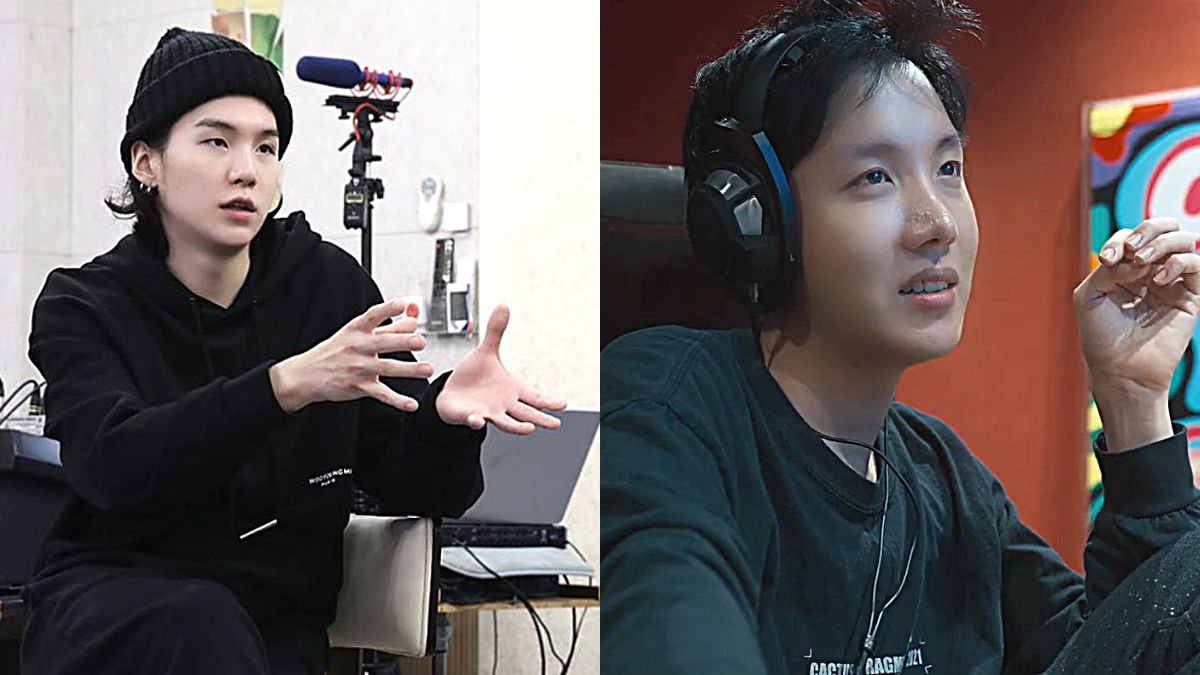To the general consumer, BTS is the Korean boy band phenom that sings upbeat colorful songs and causes a frenzy anywhere it goes. The group is all of those things, without a doubt, but also much more. It’s a combination of each of its seven members, and Disney Plus has now produced two documentaries that allow anyone interested to look beneath the bright pop surface and get to know the concerns, perspectives, and creative vision of two of BTS’ foundational members: j-hope and SUGA.
While this piece is written on the heels of SUGA: Road to D-Day‘s release, the fact that this documentary now stands beside j-hope IN THE BOX on the streaming platform begs for a double feature. Both films follow each artist as they create their bodies of work, the first ever since their band hit the pause button to allow each member to explore new (solo) avenues before committing to 18 months of military service. As such, despite having made other solo albums before, the most recent are not only the most current representation of their artistic selves, but also the most revealing (and, therefore, daunting).
There’s a lot at stake. The whole future is staring SUGA and j-hope in the face, and for the first time in pretty much a decade, it’s riddled with uncertainty, yet bursting with possibility. This contrast acts as both the driving force and the hurdle they must overcome. But the two rappers, who, along with RM make up BTS’ so-called “rap line,” are no strangers to adversity, and seeing how they navigate it makes for a gripping experience.
The usual bubbly personality of j-hope, whose real name is Jung Hoseok, turns into a deep frown when he’s deeply focused. It’s intimidating, exactly because those around him usually expect sonorous laughter from him. In j-hope IN THE BOX, however, it becomes clear that he does not, and has not ever joked around when it comes to his craft. Even a listening party with fellow industry A-listers and friends must be planned to the last detail. As for his debut solo concert in Chicago’s Lollapalooza, j-hope is deeply aware he has a lot to prove, regardless of how many sold-out stadiums he’s played with his six bandmates in the past. As a result, even the moments that are meant to feel lighthearted and unscripted on stage, he examines and perfects.
SUGA, also known as Min Yoongi, isn’t like that. He takes music and his job every bit as seriously, but most of his worrying happens internally, and that hinders him. In his film, he speaks at length about his bittersweet relationship with songwriting – how obsessed he becomes with it, and how limitless his working days always are. If he’s feeling uninspired, he struggles to put down the pen and scavenges for the missing pieces until he snaps from frustration. As a result, he not only welcomes but needs outside influence, people he can bounce off his ideas from so that they don’t eat away at his brain. He can’t have the control j-hope naturally evokes, because he craves the opposite – flow, incentive, brainstorming.
As different as each of their approaches might be, the results are all too similar in their sincerity, and above all, quality. SUGA and j-hope are heavily involved in the conception of BTS’ music. Together with RM, they write and produce most of the band’s catalog, creating an identity that combines their individual contributions with that of BTS as a group. Watching j-hope IN THE BOX and Road to D-Day you can easily see why they need each other, and why that working relationship was so fruitful all these years. To go at it alone is a challenge. They both have to take time to find their respective voices outside of the group, and it’s not that they don’t have things to say, is that they feel the pressure to find the perfect way to say them.
SUGA is contemplative and often times philosophical, reflecting on the incredible nature of his life, from the scrutiny of being an idol to the strange feeling of being the representative of an entire country out in the West, and the search for what makes him truly happy (it’s not things money can buy, but music). J-hope, on the other hand, speaks through his actions. He’s intentional in every choice he makes, hoping to prove that he is a mature artist who should be taken seriously through his work ethic and innovative creative vision.
Watching SUGA: Road to D-Day and j-hope IN THE BOX back to back is like peeling back the layers of BTS one by one. It will also make it abundantly clear why the South Korean band has gotten as far as they have.
Fantastic
If you watch anything this week, make it a BTS double-bill.

